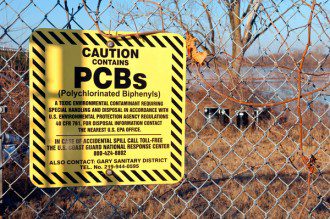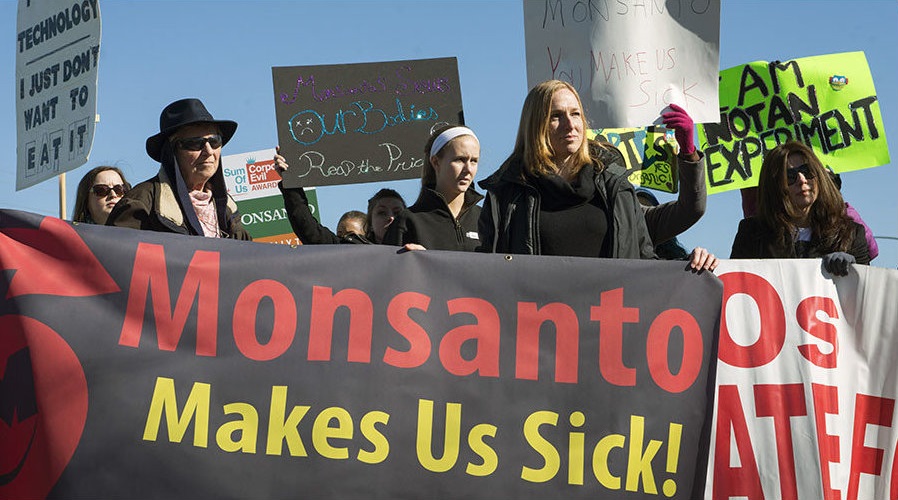Contributing Writer for Wake Up World
Facing a surge in lawsuits across the United States, chemical giant Monsanto has been given a gift of sorts from the government — one that could let the corporation off the hook for its role in decades of polychlorinated biphenyls (PCBs) pollution, effectively saving the company millions of dollars in settlements.
Pay no mind to research that demonstrates PCBs are exceptionally toxic to humans, wildlife and the environment. Also turn a blind eye to the fact that Monsanto knew for decades the chemical was extremely poisonous. And ignore that the corporation not only continued to manufacture the chemical after recognizing its toxicity, but decided it was a good idea to dump tonnes of raw PCBs into a creek adjacent to the chemical plant, essentially poisoning an entire community over the course of 40 years. For the grand finale, lets add a provision into a chemical reform bill, which protects Monsanto from lawsuits concerning said PCB contamination.
[pro_ad_display_adzone id=”110028″]
As noted by The Environmental Working Group: “Slipped at the last minute into the House version, H.R. 2576, of a bill to update the broken Toxic Substances Control Act of 1976 is a provision that could shield the company from liability for decades of pollution with a family of chemicals made only by Monsanto: polychlorinated biphenyls, better known as PCBs. While the insertion was so subtle many lawmakers probably did not even notice it, the implications of the Monsanto bailout clause are huge. The implications of the provision — added at the last minute — are significant enough that perhaps it should be called the “Monsanto bailout clause.”
How to Get Away with Ecocide — and Turn a Profit in the Process
Monsanto began commercial production of PCBs in 1929 and ultimately manufactured about 2 million tonnes, until the chemical was banned in 1979 by the EPA. PCBs were a cash cow for the company and used in everything from insulation, transformers, plasticizers and inks to adhesives, flame-retardants, paints and duplicating paper. The chemical wasn’t only highly lucrative for Monsanto, but also extraordinarily dangerous for the environment and human health. Linked to disorders of the immune, reproductive, nervous and endocrine systems, PCBs are a far cry from the ‘safe’ chemical Monsanto claimed it to be. It’s also a known carcinogen. PCBs continue to persist in the environment to this day, and are found in human fatty tissue, blood and milk, along with meat, fish and dairy products. Environmental samples of air, fresh and salt water, soil, sediment and solid waste typically show PCB contamination.
As I wrote in “The Beginning of the End for Monsanto? Communities Fight Back Against Chemical Contamination,” Monsanto promoted PCBs as a modern marvel without risk, but behind closed doors, the corporation’s own scientists recognized the chemical posed a significant contamination threat with far-reaching environmental and health consequences. Many of the company documents regarding PCBs were marked “Confidential: Read and Destroy.” Monsanto knew PCBs were highly toxic as early as 1938, and yet plowed ahead and continued manufacturing the chemical until the EPA finally shutdown production in the 1970’s. But not before the corporation made massive profits.
Because of Monsanto’s dirty dealings concerning PCBs, several municipalities are suing the corporation for damages and clean-up costs — including Oakland, San Diego and San Jose in California, as well as Seattle and Spokane in Washington. Hundreds of millions of dollars are at stake with the lawsuits, so it would be surprising if Monsanto simply rolled over and admitted defeat. What is predictable, however, is for the corporation to turn to the U.S. government for protection — which is exactly what some feel has happened with a last-minute provision added to legislation concerning how toxic chemicals are handled.
Advocates for the Environment Cry Foul
In June 2015, the House passed H.R. 2576 in order to update the Toxic Substances Control Act, or TSCA, which is the nation’s main law regulating hazardous chemicals. Early drafts in April and May didn’t have any reference to PCBs. But then, like magic, the bailout clause was inserted within the text shortly before the bill was introduced on May 26th — which also happens to be within days of yet another significant PCB legal suit filed against Monsanto.
According to the New York Times:
“The House also voted to preserve the right to sue if individuals or local governments believe they have been harmed by a chemical, regardless of future federal regulations of the substance. But a critical paragraph added to the House bill in late May made sure past regulatory requirements by the E.P.A. would continue to disqualify legal claims, and it specifically referred to the section of the 1976 toxic chemical law governing PCBs, giving Monsanto clearer authority in the future to ask judges to dismiss lawsuits filed against it. […]
“Congressional aides involved in the drafting said the language was inserted at the request of Republican staff members at the House Energy and Commerce Committee. One Republican committee aide disputed any suggestion that this was a gift to Monsanto, but he said he was not allowed to discuss the issue on the record.”
The Senate version of the bill, S. 697, contains a comparable clause. The bill passed December 2015. Since lawmakers claim it wasn’t their intention for the provision to impact private lawsuits, the House and Senate will now need to reconcile the two bills before it can become law. However, advocacy groups are concerned the bailout clause could still make it into the final bill and “leave countless victims of PCB poisoning without recourse and faultless, cash-strapped local governments to foot the bill to clean up Monsanto’s mess,” said Alex Formuzis, Vice President for Strategic Campaigns and Melanie Benesh, Legislative Attorney.
Article sources:
- http://www.ewg.org/enviroblog/2016/02/chemical-reform-law-hidden-bailout-monsanto-s-pollution
- http://www.nytimes.com/2016/03/01/business/monsanto-could-benefit-from-a-chemical-safety-bill.html?_r=0
- https://www.congress.gov/bill/114th-congress/house-bill/2576/text/ih#toc-HA5DFA57760264987B8A2783FB33AA2DC
- http://uscode.house.gov/view.xhtml?req=(title:15%20section:2617%20edition:prelim)
- http://www.chemicalindustryarchives.org/dirtysecrets/anniston/1.asp
Further reading from Carolanne Wright:
- Autistic Boy with Higher IQ Than Einstein Discovers Gift After Removal from State-Run Therapy
- Monsanto Charged with Crimes Against Nature and Humanity – Set to Stand Trial in 2016
- Dr Sebi: The Man Who Cures Aids, Cancer, Diabetes and More
- Politicians in California May Soon be Forced to Wear Corporate Sponsor Patches Like Nascar Drivers
- Plastic-Eating Mushroom Discovered in the Amazon Rainforest — A Solution for Our Trash Saturated World?
- Big Pharma and Organized Crime — They are More Similar Than You May Think
- Over 100 Scientific Studies Agree: Cannabis Annihilates Cancer
- Emotional Energetic Healing: The Future of Medicine is Here
- Why Every Parent Should Consider Unschooling
- The Greenhouse of the Future: Grow Your Own Food Year-Round With This Revolutionary System
- First U.S. City Produces More Electricity Than It Uses — With 100% Renewable Technology
[pro_ad_display_adzone id=”110025″]
[pro_ad_display_adzone id=”110027″]








